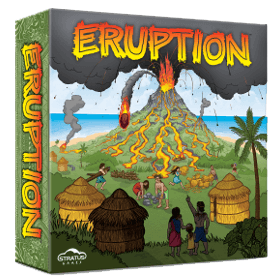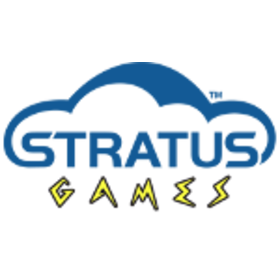Eruption
 Eruption is a game designed by Chris James and published by Stratus Games.
Eruption is a game designed by Chris James and published by Stratus Games.
Number of players: 2 - 6
Game duration: 60 mn
Complexity: 2 / 5
Play Eruption and 1229 other games online.
No download necessary - play directly from your web browser.
With your friends and thousands of players from the whole world.
Free.

Play Eruption and 1229 other games online.
No download necessary - play directly from your web browser.
With your friends and thousands of players from the whole world.
Free.

Rules summary
The inhabitants of the villages surrounding a dormant volcano were happily living in peace until — KABOOM! — the old volcano sprang back to life, unleashing rivers of molten lava in every direction and blasting volcanic rock into the sky. The villages, now faced with destruction, must do whatever they can to protect their homes from the incoming surge of lava.
Your village is about to burn up — can you take the heat?
Overview
Players control villages that are threatened by an erupting volcano. Protect your village by placing lava tiles and building walls strategically, while also trying to direct lava toward the other villages to gain valuable action cards. The player whose village is at the lowest temperature at the end of the game, wins.
Turns
Do the following on each turn, in order:
1) Assess damage - your village heats up 20 degrees on the Burn Meter for each lava flow entering your village that is not blocked by a wall. For each lava flow that is blocked by a wall, roll the dice; if the lava (orange) wins the roll, your village heats up 10 degrees and the wall is discarded. If the wall is wood, add 1 point to the white die; if the wall is stone, add 2 points to the white die. Lava (orange) wins ties.
2) Draw and place a lava tile - place the tile so that all lava flows and grassy areas connect properly to other tiles. If you place a tile on a resource space, you gain a wall of that material. After placing a tile next to a village, a player may draw one (1) Action Card for each new lava flow in contact with the village. (Note: 1 card per lava flow, not 1 per lava tile, so this can be one or two cards, depending). If you want to place a tile next to a lava flow that is blocked with a wall, you must roll the dice and the lava must win the dice roll (or else you have to place the tile elsewhere).
3) Play as many action cards as desired - you can only keep a maximum of 3 Action Cards at the end of your turn. To play a card, discard it and either carry out the effect shown on the card or retrieve a wall of the material shown (you cannot do both). You can also optionally discard 2 cards to gain an additional tile placement.
- Aftershock (×5)
Wall Equivalent: Stone - Allows a player to rotate any tile on the board to any position. The tile must remain in its current location. No tiles may violate standard tile placement rules due to the rotation of the tile. Any walls on the tile are immediately discarded.
- Lava Flow (×3)
Wall Equivalent: Straw - Allows a player to draw and place a new Lava Tile following standard tile placement rules.
- Relocate (×5)
Wall Equivalent: Straw - Allows a player to move one or more walls in their village to any other location within the village. After doing so, no more than one wall may exist in any location.
- Sinkhole (×4)
Wall Equivalent: Wood - Allows a player to discard any existing tile from the board, along with any walls built on it. No tiles may violate standard tile placement rules due to the removal of the tile.
- Quake (×5)
Wall Equivalent: Stone - Allows a player to draw a new Lava Tile and immediately replace any existing tile on the board. The new tile must follow standard tile placement rules. The old tile, along with any walls built on it, is discarded from the board. If no replacements can be made, the tile is placed randomly within the stack and another tile is drawn. If the new tile creates new connections to a village, draw one (1) Action card for each new lava flow in contact with the village.
- Rain (×4)
Wall Equivalent: Wood - Allows a player to immediately cool down their own village by 30 degrees on the Burn Meter.
- Reinforce (×6)
Wall Equivalent: Straw - Allows a player to immediately build a wall from their stockpile, in addition to the one wall normally allowed at the end of the turn.
- Volcanic Bomb (×4)
Wall Equivalent: Wood - Allows a player to discard any wall that is currently on the board, belonging to any player.
4) Build a wall (optional) - place a wall piece (of any material) on the border next to your village or on a specific lava flow on the board.
Burn Meter
As a village heats up on the Burn Meter, the player who owns the village gains additional abilities in each Danger Zone.
Danger Zone 1 - the player may build an extra wall on their turn.
Danger Zone 2 - the player may draw an Action Card AND build an extra wall on their turn.
Danger Zone 3 - the player may place an extra Lava Tile AND draw an Action Card AND build an extra wall on their turn.
The first player to enter each Danger Zone must place the corresponding Eruption tile. This tile can be placed anywhere on the board and does not have to connect to other tiles (it is its own source of lava). When this tile is placed, all other players increase in temperature by 30 degrees.
Ending the Game
The game ends when either of the following events occurs:
1) A village reaches the last space on the Burn Meter and remains there at the end of the turn. The remaining Lava tiles are removed from the board and the other players take one final turn.
2) The last Lava Tile is placed. The current player finishes their turn, and all players (including the current player) take one final turn.
The player with the lowest temperature on the Burn Meter wins. If two players tie, add three for every stone wall at your own village or in your stockpile, two for a wooden wall and one for a straw wall and reduce that figure by the number of lava streams reaching your village. The higher number wins.

